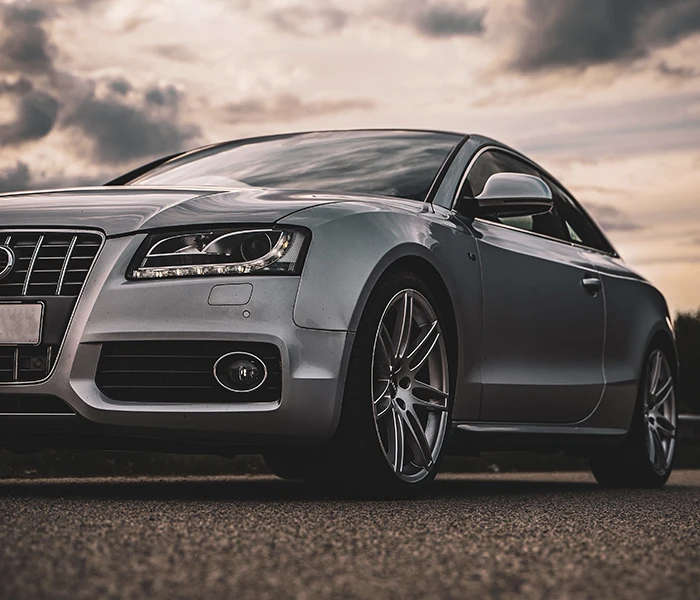
Personal Contract Purchase (PCP) is a great financing option for buying a car with lower monthly repayments and without paying the entire purchase price upfront. Instead, the cost of the vehicle is divided into regular instalment payments over a fixed period. PCP is arguably one of the most popular forms of car finance due to the lower monthly payments. Various sources place it at 80% – 90% of all new cars bought on PCP in the UK. In this blog post, we’ll delve into what PCP finance entails when purchasing a car. How it works, what happens at the end of a PCP agreement, and discuss its advantages and disadvantages.
- What Is PCP Finance
- Advantages
- Disadvantages
- How PCP Finance Work
- What Happens at the End of a PCP Agreement
- Is PCP Finance Right For You
- How Much Does PCP Cost
- The Benefits of Using a Finance Broker
What Is PCP Finance
As mentioned, Personal Contract Purchase (also called just PCP) allows you to buy a car through regular monthly payments rather than outright paying the total vehicle cost.
Unlike a traditional car loan or Hire Purchase agreement, PCP finance offers flexibility by providing lower monthly payments. It achieves this by deferring a significant portion of the car’s value to the end of the agreement, known as a balloon payment.
With PCP, you pay an upfront deposit and pay off anywhere from 50% to 75% of the car’s remaining value, plus the interest charged, in regular monthly instalments. Because you only pay off a portion of the car’s entire value, the monthly repayments are lower than what the repayments on a Hire Purchase agreement would be. The monthly instalments are fixed based on the agreed interest and the length of the agreement. Your interest is based on several factors, with your credit score being one of the most important.
When taking out a PCP agreement, you can choose the term length, with the most common agreement term being two to four years. At the end of the agreement, you have three options:
- Return the Car
- Keep the Car
- Trade-In or Part-Exchange
We have gone into more detail on What Happens at the End of a PCP Agreement below.
Advantages
- Lower Monthly Payments: The critical benefit of PCP finance is the lower monthly payments compared to traditional car loans. By deferring a portion of the car’s value to the end of the agreement, you can enjoy more affordable payments.
- Flexibility at the End of the Agreement: PCP finance gives you flexibility at the end of the agreement. You can return the car, keep it by paying the balloon payment, or trade it for a new vehicle. This flexibility allows you to reassess your needs and make a decision that aligns with your circumstances.
- Potential for Newer Cars: As PCP agreements typically have shorter terms, you can upgrade to a newer model more frequently. This ability to upgrade can be appealing if you enjoy driving the latest vehicles and want to avoid the hassle of selling or trading in a car that you outright own.
- Protection against Depreciation: By setting the Guaranteed Future Value (GFV) at the beginning of the agreement, you can avoid the risk of the car’s value falling significantly below what was expected. If the car’s value decreases more than anticipated, it becomes the finance company’s responsibility, not yours.
Disadvantages
- Ownership Costs: With PCP finance, you don’t own the car outright during the agreement term. The finance company retains ownership until you make the final payment or trade it for a new vehicle. This means you’re responsible for any maintenance and repairs during the agreement.
- Mileage and Condition Restrictions: PCP agreements typically have mileage and condition restrictions. Exceeding the agreed-upon mileage or failing to keep the car in good condition may incur additional charges. It’s essential to assess your driving habits and ensure they align with the restrictions to avoid unexpected costs.
- Potential Negative Equity: Negative equity can occur in a PCP agreement if the car’s value depreciates more rapidly than expected. If the estimated value at the end of the agreement is higher than the actual market value, you may owe more than the car is worth. This can make it challenging to trade in the vehicle or obtain a new PCP agreement without covering the shortfall.
- Interest Charges: While PCP finance generally offers lower monthly payments, it’s essential to consider the overall cost of the agreement. The interest charges on PCP finance can be higher than those of traditional car loans. This means you may pay more in interest over the agreement term.
Find out how much you could finance using our free online car finance calculator →
How PCP Finance Works
The process of using PCP to buy a car involves the following steps:
- Choosing the car you want to buy: You choose the car you wish to purchase.
- Deposit: When entering into a PCP agreement, you are required to make an initial deposit. This amount is typically a percentage of the car’s value, ranging from 10% to 30%. The larger the deposit, the lower the monthly payments will be.
- Monthly Instalments: You’ll be responsible for making fixed monthly payments, which cover the depreciation and interest on the car. These payments are typically lower than those associated with traditional car loans or Hire Purchase agreements. The monthly payments are calculated based on the car’s value at the start of the agreement minus the deposit and the estimated future value of the vehicle at the end.
- Guaranteed Future Value (GFV): At the beginning of the PCP agreement, the finance company determines an estimated future value for the car, known as the Guaranteed Future Value or GFV. The GFV represents the car’s anticipated worth at the end of the agreement, considering factors such as mileage and condition. It serves as the optional final payment.
- End of Agreement: When the PCP agreement reaches its conclusion, you have three options: Return the Car, keep the Car or trade-In.
We have gone into more detail on What Happens at the End of a PCP Agreement below.
What Happens at the End of a PCP Agreement
At the end of a PCP (Personal Contract Purchase) agreement, you have three options to consider. Let’s explore each of them in detail:
1. Return the Car
One option is to return the car to the finance company at the end of the PCP agreement. This is known as the voluntary termination or hand-back option. If you choose this option, you can hand over the keys and walk away if you have adhered to the mileage and condition restrictions outlined in the agreement. You may be responsible for any excess mileage charges or damage beyond fair wear and tear. The finance company will assess the car’s condition and mileage to determine if additional charges apply.
2. Keep the Car
If you’ve grown attached to the car and wish to keep it, you can make the final payment, known as the balloon payment or guaranteed future value (GFV). The GFV is the predetermined value of the car at the end of the PCP agreement. It is established at the beginning of the contract based on factors such as the car’s age, mileage, condition, and depreciation rate. By paying the balloon, you gain full ownership of the vehicle. You can pay the balloon in one lump sum or explore financing options to spread out the payment. Once the balloon is paid, the car is yours to keep without any further financial obligations to the finance company.
3. Trade-In or Part-Exchange
The third option at the end of a PCP agreement is to trade in the car for a new vehicle. If you wish to upgrade to a different car, you can use the equity in your current vehicle as a deposit toward a new PCP agreement or another type of car finance. The equity is the difference between the car’s market value and the remaining finance owed. The excess can be used as a deposit if the car’s trade-in value exceeds the remaining finance. However, if the trade-in value is lower than the remaining finance, you will have negative equity, and you may need to cover the shortfall or include it in the financing of the new vehicle.
It’s important to note that the options at the end of a PCP agreement may vary depending on the specific terms of the agreement and the finance provider. Therefore, it’s recommended to review the terms and conditions of your PCP agreement carefully to understand the available options and any associated costs or fees.
Is PCP Finance Right For You
If you are looking to reduce your monthly payments and change your car frequently then PCP is right for you.
It is essential to consider all your car finance options, and we have broken down all the options for you.
Car Finance Explained →
How Much Does PCP Cost
Several factors determine the cost of a PCP car finance agreement.
1. The Car’s Purchase Price
The total cost of the car is a significant factor in calculating the PCP agreement’s expense. The higher the purchase price, the more you will need to finance, resulting in higher monthly payments and potentially more interest charges over the loan term.
2. Your Deposit Amount
The initial deposit you pay at the beginning of the PCP agreement can impact the overall cost. A larger deposit will reduce the amount you need to finance, resulting in lower monthly payments and potentially lower interest charges. Conversely, a smaller deposit will increase the amount you need to finance, leading to higher monthly payments and potentially higher interest charges.
3. Loan Term
The length of the Hire Purchase agreement, commonly expressed in months, impacts the cost. A longer loan term generally means lower monthly payments but higher overall interest charges. On the other hand, a shorter loan term may result in higher monthly payments but reduced interest expenses.
4. Monthly Payments
The monthly payments you make during the term of the PCP agreement cover the depreciation and interest on the car. The monthly payment amount depends on the purchase price of the car minus the deposit and the estimated future value (GFV) at the end of the agreement. A higher purchase price or lower GFV will result in higher monthly payments, while a lower purchase price or higher GFV will lead to lower monthly payments.
5. Interest Rate
The interest rate, often called the Annual Percentage Rate (APR), is a significant factor in determining the cost of PCP finance. The interest rate represents the cost of borrowing and is applied to the outstanding balance of the finance amount. A lower interest rate will result in lower overall interest charges and a more affordable PCP agreement.
6. Optional Extras
If you add optional extras to the car, such as additional features or accessories, these costs will be included in the overall PCP finance amount. It’s essential to consider the impact of these extras on the total cost and monthly payments.
7. Balloon Payment
The balloon payment represents the optional final payment required at the end of the PCP agreement if you decide to keep the car. This payment is determined at the beginning of the agreement and is based on the vehicle’s estimated future value (GFV). The size of the balloon payment will affect the overall cost of PCP finance.
It’s worth noting that the cost of PCP finance is not solely based on the monthly payments. To assess the total cost accurately, consider the deposit, interest charges, optional extras, and balloon payment if you choose to keep the car. Comparing quotes from different lenders or dealerships can help you understand the cost variation and choose the most competitive PCP finance option.
It’s advisable to carefully review the terms and conditions, including the interest rate and any additional fees, to understand the total cost of PCP finance clearly. Additionally, consider your budget and financial circumstances to ensure that the monthly payments and overall cost of the PCP agreement are manageable for you.
Find out how much you could finance using our free online car finance calculator →
The Benefits of Using a Finance Broker
Applying for Hire Purchase through a car finance broker can offer several benefits compared to approaching lenders directly. Here are some advantages of using a car finance broker for Hire Purchase:
1. Access to Multiple Lenders
Car finance brokers work with multiple lenders, which means they can access a wide range of finance options and help you find the most suitable terms and competitive interest rates. Instead of approaching each lender individually, a broker can streamline the process by presenting you with multiple offers.
2. Expert Guidance and Support
Car finance brokers are experienced professionals who understand the intricacies of the loan application process. They can provide expert guidance and support throughout the process, helping you navigate through paperwork, explain complex terms, and answer your questions. Their expertise can save you time and effort while ensuring you make informed decisions.
3. Tailored Solutions
A car finance broker takes the time to understand your specific financial situation, needs, and preferences. They can then search for loan options that align with your requirements. Considering your credit score, income, and budget can help you find a PCP agreement that suits you. This personalised approach increases the chances of securing a loan that fits your needs.
4. Time and Effort Savings
Instead of spending hours researching different lenders and comparing loan terms, a finance broker can do the legwork for you. They have established relationships with various lenders and can quickly identify the most suitable options based on your criteria. This saves you time and effort, allowing you to focus on other car-buying aspects.
5. Negotiation on Your Behalf
Car finance brokers are skilled negotiators who can leverage their relationships with lenders to secure favourable terms on your behalf. They can negotiate interest rates, loan terms, and fees to obtain better loan conditions than you could achieve. This can result in cost savings over the loan term and increase the overall affordability of the Hire Purchase agreement.
6. Assistance with Complex Situations
A car finance broker can be beneficial if you have a unique financial situation or credit challenges. They have experience working with clients with bad credit, limited credit history, or other complexities. A broker can guide you in presenting your case to lenders, increasing the likelihood of approval and finding a suitable solution.
7. Seamless Application Process
Applying for Hire Purchase through a car finance broker streamlines the application process. They handle the paperwork, documentation, and communication with lenders, ensuring everything is completed accurately and efficiently. This reduces the chances of errors or delays that could impact your loan approval.
Conclusion
PCP finance provides an alternative car financing option that offers lower monthly payments, flexibility at the end of the agreement, and the potential for upgrading to newer models. However, it’s essential to consider factors such as ownership costs, mileage restrictions, potential negative equity, and interest charges before deciding if PCP finance is the right choice for you. Assess your circumstances, preferences, and budget to make an informed decision that aligns with your car-buying goals.
Try our free online car finance calculator to see how much you could finance, or contact us and let us save you time, money and effort getting you the car of your dreams.
info@dorsiafinance.co.uk | 01522 420 420

